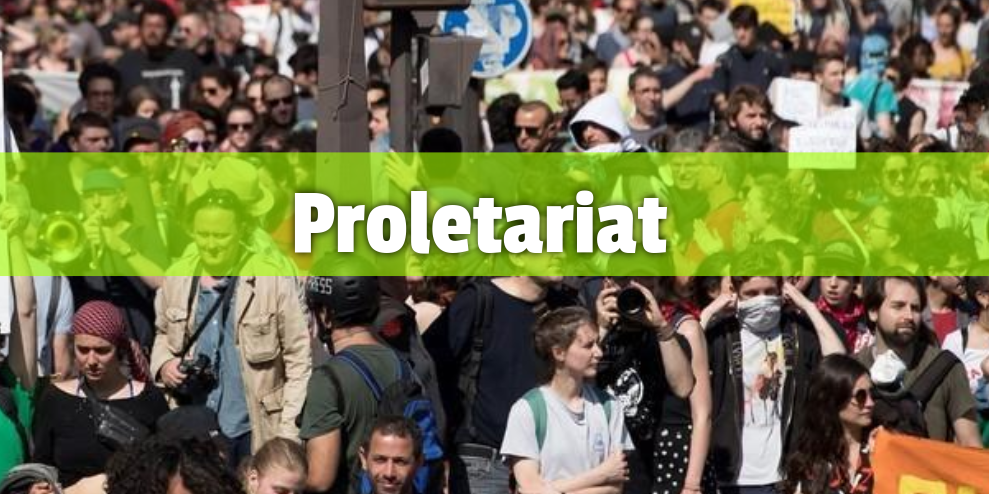Proletariat

The proletariat is the characteristic working class of the capitalist mode of production. Because of its place in it - producing surplus value through its collective work - it is at the same time an exploited, universal and revolutionary class.
The proletariat as a universal class
The proletariat is a universal class in two different ways:
- It exists all over the world, as a product of a capitalism that has long since conquered the whole planet, and what defines it as such - being a product of the capital-labor relationship - is identical everywhere; that's why it has one single set of interests all over the planet.
- When it fights as a class it does not claim any particular privilege that prepares a new form of exploitation, it claims universal, human and generic needs; anticipating a society, communism, in which production becomes a conscious and collective activity oriented not by capital and its logic of accumulation but by the satisfaction of those very needs.
The proletariat as a revolutionary class
As a universal class, the communist perspective is present in every expression of struggle, whether that perspective is developed or not. This is why the proletariat is the revolutionary class of the capitalist mode of production, regardless of the ebbs and flows of its class consciousness.
It is not a question of knowing what this or that proletarian, or even the proletariat as a whole, is momentarily proposing as an end. It is about knowing what the proletariat is and what it must historically do according to its being. Its aim and its historical action are mapped out for it, in a tangible and irrevocable way, in its own situation of existence, as in the whole organization of bourgeois society today.
Marx and Engels, The Holy Family, 1844
The process of constitution as a class
Historically the class appeared as a class "in relation to capital", that is, as an exploited mass producing surplus value. It was the first struggles that went beyond the factory or the local demand - the 8-hour day for example - that first made the proletariat leap into a class for itself, a class capable of understanding, expressing itself and fighting as such over the divisions imposed by production or the ideological apparatus of the system. The proletariat then constitutes itself "as a class and therefore as a political party ", as the Communist Manifesto will describe, insofar as its struggle makes it a political subject of its own and independent of any faction of the bourgeoisie.
This movement of affirmation through class struggle occurred in parallel with the emergence of the first political and programmatic expressions of the workers. Minorities such as the "Icarian communists" in France or the "League of the Just" in Germany, which evolved from 1847 onwards to distill a scientific theory of the communist perspective: Marxism. From that moment it became clear that the proletariat needed to constitute itself as the ruling class of society by seizing political power, in order to end the capital-labor relationship and de-commodify society de-commercialize society.
In other words, the process of the constitution of the proletariat begins with its sociological existence as a class for capital, develops with its appearance as a political subject and culminates, after the revolution, with its conversion into the ruling class.
Class consciousness
This process of constituting itself as a class until becoming a ruling class, in order to end the very material basis of the existence of social divisions, is in fact a process of gaining consciousness.
The class consciousness of the proletariat is nothing other than the consciousness of the need for and the possibility of communism. It is consciousness of the need that is historically determined by the inability of capitalism to further develop the productive forces at the disposal of our species; and consciousness of the possibility that its place in production and its own political development as a class allows it to do so.
As an exploited class, the proletariat is deprived of the means of production, including the means of intellectual production. So this class consciousness is not expressed as a "state of opinion," but as a dialectic that is the very essence of the process of constituting itself into a class, among its most conscious and active minorities-who form even at the worst moments a "party in the making" -and the course of its struggles. The process is resolved by the constitution of the class as the leading party of society through the prior constitution of a class party that becomes the leading faction of the class as a whole.
The class is defined by its relationship to the future
Therefore, what defines the class at each moment of its development is its relationship to the future, Communism, in relation to the present.
http://dictionary.marxismo.school/ProletariatCommunism is not a state to be implanted, an ideal to which reality must be subjected. We call communism the real movement that cancels out and surpasses the present state of things. The conditions of this movement are derived from the currently existing premise.
Marx and Engels. The German Ideology, 1846